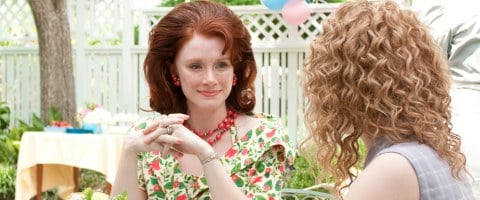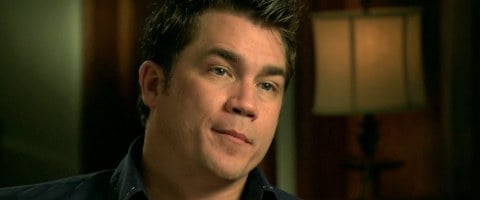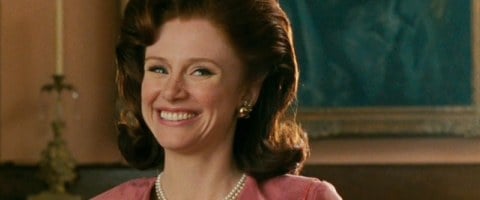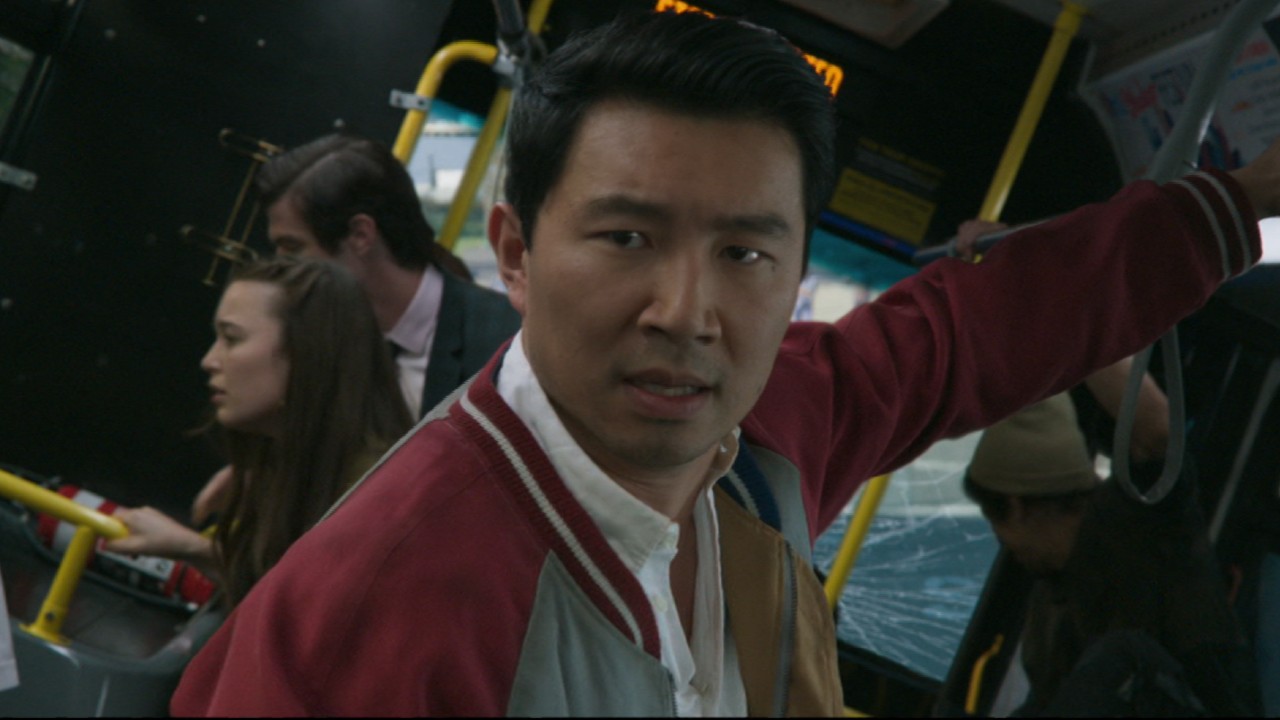Talking To Bryce Dallas Howard And Director Tate Taylor On The Set Of The Help

It's 95 degrees in New York City today, which makes today kind of perfect to revisit my trip to the set of The Help, which was shooting last August in Greenwood, Mississippi under the sweltering conditions that are typical for the area but no less unbearable. You may have already caught my conversations with stars Emma Stone, Viola Davis and Octavia Spencer from the set; today I've got the film's director, Tate Taylor, plus Bryce Dallas Howard, who plays the film's villain Hilly Holbrook.
But in a movie like The Help, the term "villain" is a little tricky-- she's not exactly cut and dry evil like Lord Voldemort or Captain America's Red Skull. Based on Kathryn Stockett's bestselling novel, The Help stars Stone as Skeeter Phelan, a recent Ole Miss graduate returning to her hometown of Jackson, Mississippi in the summer of 1963 and chafing at the strict social structure for women of her class. Hilly Holbrook, Howard's character, has been Skeeter's best friend since childhood, but whereas Skeeter thinks things like the Junior League and bridge games are a little shallow, they are Hilly's entire world. Hilly has also bought wholesale into the deep racism of the period, leading an initiative for white families to build separate, shoddy bathrooms for their African-American "help" to use, and demeaning most of the black women she comes in contact with, which includes maids like Aibileen (Davis) and Minny (Spencer).
Hilly gets her own in the end, though, as Skeeter decides to write a book telling the experience of these African-American maids, and of course, the Civil Rights movement starts taking hold around the country at the same time. On the set I joined a group of other journalists talking to both Howard and Taylor about that historical resonance, plus the experience of shooting on location in Mississippi-- Taylor, a native of the state, was right at home, while Howard used her mother's experience growing up in Louisiana to get into the time period. Check out what they both had to say below, and see The Help in theaters on August 10.

Tate Taylor
Did you have to fight hard to film in Mississippi and not stay in Louisiana for the tax breaks and all that kind of stuff?
Being from Mississippi, I grew up coming to Greenwood and Greenwood kind of stopped in time in '63. Besides wanting to film in my state and give back and bring money to it, I knew we would be basically living on a backlot, which is what it feels like. I knew that for the characters it would be good to kind of be thrown into a communal throwback to the time. We had to fight for it. We took pictures and we put together a ‘look book’ of all the houses we found so when I we went to DreamWorks, they’re like "Oh, where do you want to film it? Vancouver? Shreveport?" I said "No, here!" I literally gave it to Steven Spielberg and he went, "Wow!" Not DreamWorks, but all studio--if they’ve filmed somewhere before, if it’s not broke don’t fix it. They’re afraid of somewhere new. But now everybody’s thrilled.
What do you think people don’t understand about Mississippi that they will understand when they see this movie?
Your Daily Blend of Entertainment News
My whole life I’ve been asked if we have malls here. People just don’t know. They just don’t. It’s just that people are extremely friendly and we have all the necessities of life and then some. But I kind of like that, when people come here with an understandable ignorance and they come down here and it’s been so fun to watch everybody.
Can you talk a little bit about creating the period: I know that the town hasn’t moved on a lot but still the homes have microwaves and everything like that.
Mark Rikker, our production designer, he and I started off as production assistants in New York. We used to be P.A.’s on J. Crew catalogue photo shoots together. We would be in the Hamptons, going out looking for oatmeal cookies for a hundred bucks a day. He’s got such an eye and he's from the South. As he’s been coming up in the ranks, he’s been doing some great work. He and Stephen Goldblatt [the director of photography] worked together on Julia and Julia’ and that was this period and it looked so great and that was in Brooklyn. Brooklyn for Paris. They did such a great job. I wanted to hire all friends that we’ve all come up together with.
You're also adapting a book written by your friend. You’ve got to try to make a movie that’s good while staying true to the book and honoring what your friend has made. How hard is that to get yourself in director mode and be able to change things? You have to change something.
We have a great relationship, Kathryn and I. It could have gone poorly, but when I outlined the movie from the book, we met in New York and I said this is what I’m going to do. There was only one thing she didn’t agree with and she was right.
Can you tell us what it was?
I didn’t think we should talk about the Jim Crow Laws because I felt like people know what that is and she told me when she wrote the novel, her editors in New York -- highly educated people -- had no clue about Jim Crow Laws. I go, are you kidding me? I know, I swear. You think people know. They don’t, so she goes I’m telling you put it in and I did. I thought, being a southerner, it was too much. Oh really? Of course there’s Jim Crow Laws. That was the one thing.
What are the challenges of taking a book that is all voices and all kind of internal and making it cinematic?
Nothing’s hard about making her book cinematic. It’s just which things to cut out or to cut down. Mainly I had to get the first two hundred pages into thirty pages of a screenplay. That was the toughest part. But the first two hundred pages of the book was when Minny talks and Aibileen talks and them talking, describing their lives a lot. So I got to figure out, we can see this, we can see that, we can understand this. I just had to whittle down and then get to what they were saying that needed to be said. It took two years, but that’s what I did.

Bryce Dallas Howard
Have you adjusted to seeing yourself this way in costume, like when you walk by a mirror?
It’s really weird. And also just ‘cause the character’s so despicable there’s a couple of times that I’ve gone to watch playback, like, to watch the scene over again, just to see a gesture that I did so that I can match it, and I literally, I, like, kinda cringe, like I don’t really want to look at it. What’s interesting is when you start doing a role, at first the image of the character is really shocking but then you play the character, like, 18 hours a day.
Oh, so you’re more shocked by the real you now.
Yeah, because proportionally, you’re more hours the character than you are yourself.
How easy is Hilly to slip into because she’s not a nice woman.
No, she’s really not a nice woman. But it’s really fun to be such a terrible character and I think that the feeling on set is so joyful. In reading the book – and the script is the same way – it’s a really salacious read, it’s really juicy, but it does at moments get really quite heavy. I think Tate has created this environment on set of making everyone feel really playful so that in those moments where it’s really intense and obviously incredibly loaded given our history as a country, that we don’t fall into this lull as actors of just being like "Oh my gosh, this is too much.” Normally for a character like this I would not be able to sleep at night and all of that kind of stuff, but I think because of the feeling that Tate’s created on set, it’s just when she’s evil, it’s really, you know, it’s more fun than it is scary.
Can you talk a little bit about working on the accent? And is the accent not just a matter of place but also of time, is there a different accent in the 60s than now?
Definitely. Nadia, the dialect coach, has been really specific and she’s recorded a lot of people whose dialect would be pure according to the time period. So, people who have retained their accent from the 60s and, you know, were part of the Junior League and just a part of, like, the social circles that these women would’ve been a part of.
Are accents easy for you?
It’s really fun, I really love it and I look forward to it and I enjoy it, but I really appreciate and need the support of a dialect coach. I wouldn’t know where to begin in terms of the nuance of the accent. I would be able to do probably, like, you know, a broad Southern accent but--
It might be the wrong city, the wrong time.
Exactly. Like the only other time I’ve done a Southern accent, I played a character in the 1920s from Memphis. And, so of course there are similarities but there are some pretty distinct differences as well that Nadia pointed out when I first started doing it.
And what’s the trick of, like, playing kind of the snake in the grass? Like in this scene, we’re watching you be really friendly and open but there’s still, maybe because we’ve all read the book, but we still sense kind of the darkness in the there too. It’s gotta – they’ve gotta be there at the same time.
Right. She’s kind of this duplicitous character in that way. I was doing sort of like more of this arch villain thing at first and someone said, “Bryce, you really – you have to protect these women and this time in all this devastating honesty." Most women were definitely not like Hilly, Hilly’s a particular person, clearly. But it is really important to play that she’s not just a two-dimensional character. I mean, she, she believes in certain things and, and obviously it’s, it’s not only misguided, I mean, it’s evil, it’s – her beliefs are evil, but there is an origin for her beliefs. It’s important to really kind of understand the psychology behind it.
Did you do a lot of research, outside of reading the book, to figure out this time period?
The research that I did was fascinatingly personal because my mom was raised a lot in the South in Louisiana. She was born in the 50s so in the 60s and 70s, she was at times ostracized and called “the Northerner." She actually started reading The Help and had to put it down because it was so intense for her to read it. And now she’s picked it up again and she was like, “I can read Stephen King before bed, I can read Anne Rice before bed, but I have to read The Help during the day,” because it rattles her. And so I spent a lot of time talking to her just about her experiences and what was normal and what wasn’t.
Staff Writer at CinemaBlend

